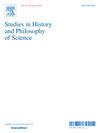Understanding data uncertainty
IF 1.8
2区 哲学
Q1 HISTORY & PHILOSOPHY OF SCIENCE
引用次数: 0
Abstract
Scientific data without uncertainty estimates are increasingly seen as incomplete. Recent discussions in the philosophy of data, however, have given little attention to the nature of uncertainty estimation. We begin to redress this gap by, first, discussing the concepts and practices of uncertainty estimation in metrology and showing how they can be adapted for scientific data more broadly; and second, advancing five philosophical theses about uncertainty estimates for data: they are substantive epistemic products; they are fallible; they can be iteratively improved; they should be judged in terms of their adequacy-for-purpose; and these estimates, in turn, are essential for judging data adequacy. We illustrate these five theses using the example of the GISTEMP global temperature dataset. Our discussion introduces a novel adequacy-for-purpose view of uncertainty estimation, addresses a weakness in a recent philosophical account of data, and provides a new perspective on the “safety” versus “precision” debate in metrology.
理解数据的不确定性
没有不确定性估计的科学数据越来越被认为是不完整的。然而,最近关于数据哲学的讨论很少关注不确定性估计的本质。我们开始纠正这一差距,首先,讨论不确定度估计在计量学中的概念和实践,并展示它们如何更广泛地适用于科学数据;其次,提出了关于数据不确定性估计的五个哲学命题:数据不确定性估计是实质性的认知产物;他们会犯错;它们可以被迭代地改进;应该根据它们的目的是否充分来判断它们;而这些估计反过来又对判断数据是否充足至关重要。我们以GISTEMP全球温度数据集为例来说明这五个论点。我们的讨论引入了一种新的不确定性估计的目的充分性观点,解决了最近数据哲学解释中的一个弱点,并为计量学中的“安全”与“精确”之争提供了一个新的视角。
本文章由计算机程序翻译,如有差异,请以英文原文为准。
求助全文
约1分钟内获得全文
求助全文
来源期刊

Studies in History and Philosophy of Science
管理科学-科学史与科学哲学
CiteScore
2.50
自引率
10.00%
发文量
166
审稿时长
6.6 weeks
期刊介绍:
Studies in History and Philosophy of Science is devoted to the integrated study of the history, philosophy and sociology of the sciences. The editors encourage contributions both in the long-established areas of the history of the sciences and the philosophy of the sciences and in the topical areas of historiography of the sciences, the sciences in relation to gender, culture and society and the sciences in relation to arts. The Journal is international in scope and content and publishes papers from a wide range of countries and cultural traditions.
 求助内容:
求助内容: 应助结果提醒方式:
应助结果提醒方式:


